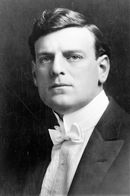Maxwell Henry Aronson, later known as Gilbert M. Anderson, was born in Little Rock, Arkansas, to parents Esther (Ash) and Henry Aronson. His father, Henry, was of German Jewish descent, while his mother, Esther, was the daughter of Russian Jewish parents. Anderson's early life was marked by various occupations, including working as a photographer's model and newspaper vendor before entering the world of acting.
Before transitioning to film, Anderson performed in vaudeville and collaborated with Edwin S. Porter as an actor and occasional script writer. His breakthrough role came in Porter's 1903 film, The Great Train Robbery, where he played multiple characters, including the train passenger shot by bandits while trying to escape.
The success of The Great Train Robbery prompted Anderson to create his own series of Westerns, often writing, directing, and starring in them. In 1907, he co-founded Essanay Film Manufacturing Co. with George K. Spoor, which would become one of the leading early film studios. Anderson's popularity soared as he starred in hundreds of Western shorts, playing the iconic role of "Broncho Billy," the first real cowboy hero.
As a creative force behind Essanay, Anderson wrote and directed most of the films, including a series of "Alkali Ike" comedy Westerns starring Augustus Carney. In 1916, Anderson sold his ownership in Essanay and retired from acting, returning to New York to purchase the Longacre Theatre and produce plays.
Although he achieved limited success in the theater, Anderson made a brief comeback as a producer with a series of shorts starring Stan Laurel for Metro Pictures. However, conflicts with the studio led him to retire again after 1920. He continued to produce films as the owner of Progressive Pictures until the 1950s.
In his 70s, Anderson made a cameo appearance in The Bounty Killer (1965). He had previously been honored with an honorary Oscar in 1957 for his contributions to the development of motion pictures as entertainment. Anderson passed away in 1971 at the age of 90.



















